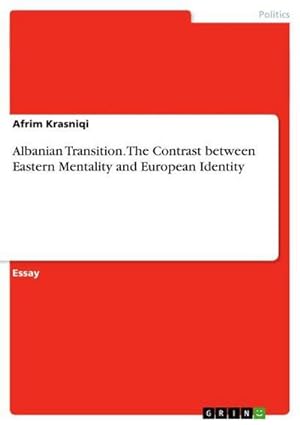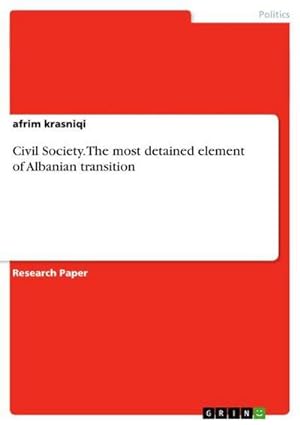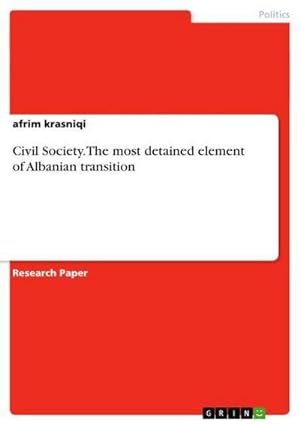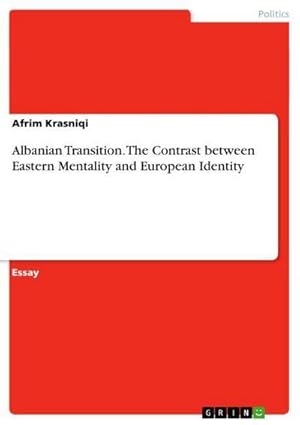Krasniqi Afrim (6 results)
Product Type
- All Product Types
- Books (6)
- Magazines & Periodicals
- Comics
- Sheet Music
- Art, Prints & Posters
- Photographs
- Maps
-
Manuscripts &
Paper Collectibles
Condition
- All Conditions
- New
- Used
Binding
- All Bindings
- Hardcover
- Softcover
Collectible Attributes
- First Edition
- Signed (1)
- Dust Jacket
- Seller-Supplied Images
- Not Printed On Demand (3)
Seller Location
Seller Rating
-
Albanian Transition. The Contrast between Eastern Mentality and European Identity
Published by GRIN Verlag Jul 2014, 2014
ISBN 10: 3656679142ISBN 13: 9783656679141
Seller: BuchWeltWeit Ludwig Meier e.K., Bergisch Gladbach, Germany
Book Print on Demand
Taschenbuch. Condition: Neu. This item is printed on demand - it takes 3-4 days longer - Neuware -Essay from the year 2014 in the subject Politics - International Politics - Region: Other States, grade: A, University of Tirana (Albanian Institute of Political Studies), language: English, abstract: During the last two decades leading Albanian political actors have developed political activity based on two parallel indicator: western formal models and marketing electoral programs, as well as eastern oriental model in the way they have designed and developed policy, elections, internal democracy and public discourse. Being correct to western formal models came as foreign imposition, as needed impersonation in terms of lack of experience and practical knowledge, as well as the response of major civic expectations.The conclusion of this material is that we are dealing with continuous coexistence between Western model in programs and eastern model in practical implementation of these programs. Practical application of a parallel political system, in values, methods and political discourse was due to domestic consumption needs, fragility in the formation of political culture, local recognition of the dominant methods in politics and the pursuit of short-term political goals.This thesis paper aims to analyze the formal western presentation of the two main political parties and their leaders during the transition, and to make this analysis in comparative relation to feeds and real features in daily political activity. Part of the study are the programs and the most important political positions, international relations associated with the level of democracy and the role of political parties in shaping a democratic, professional studies in the field of political behavior and political discourse. 12 pp. Englisch.
-
The profession of political science scholars in Albania. Experiment and uncertainty about the future
Published by GRIN Verlag Jul 2014, 2014
ISBN 10: 365666594XISBN 13: 9783656665946
Seller: BuchWeltWeit Ludwig Meier e.K., Bergisch Gladbach, Germany
Book Print on Demand
Taschenbuch. Condition: Neu. This item is printed on demand - it takes 3-4 days longer - Neuware -Research Paper (postgraduate) from the year 2014 in the subject Politics - International Politics - Region: South East Europe, Balkans, University of Tirana (Albanian Institute for Political Studies), language: English, abstract: This paper addresses the misbalanced rapport between the 'trendy' university supply during the last decade in Albania (political science and international relations) and the real demand of the labor market. The massive stride towards these professions was made without having quality counseling information on their perspectives and employment opportunities. Public and university institutions preferred the quantity and appearance of the studies, considering the quality supply and the studies' content as secondary. Part of this study are tests carried out on 4-5 generations of 'trendy' sciences alumni, who have completed their studies and have been facing the labor market for several years. The conclusions of this test, which was carried out for the first time in Albania, constitute valuable information for the public, universities, youth and their families. Considering the above-mentioned phenomenon as a transition phenomenon taking place in the majority of former communist countries, this study puts forward experiences and makes comparisons and concrete suggestions for the Albanian case. Its thesis supports the slogan: 'professions, no diplomas', and suggests pursuing studies in technology, information technology, natural sciences, service sector domains etc.Through the current balance and successful models applied in any other country similar to Albania, this study emphasizes the responsibility for a long-term career orientation program for the youth in making their profession choice, and a university system moving towards the long-term labor market needs in the country. It concludes by stating that this process requires an essential reformation of the public information system, an active and public partnership between university institutions and potential actors in the labor market, as well as periodic public reports that analyze the developments, expectations, suggestions and tendencies in the future decades. 20 pp. Englisch.
-
Civil Society. The most detained element of Albanian transition
Published by GRIN Verlag Jan 2014, 2014
ISBN 10: 3656569967ISBN 13: 9783656569961
Seller: BuchWeltWeit Ludwig Meier e.K., Bergisch Gladbach, Germany
Book Signed Print on Demand
Taschenbuch. Condition: Neu. This item is printed on demand - it takes 3-4 days longer - Neuware -Research Paper (postgraduate) from the year 2006 in the subject Politics - International Politics - Region: South East Europe, Balkans, , course: 1, language: English, abstract: In 1990 Albania changed its political system. In 2006 it signed Stabilization Association Agreement with EU and in 2008 received the invitation to NATO membership. 18 years ago it was hard to find a single Albanian who believed the process of democratic transformation would take more than one decade to ensure a place in the European community. Today it is hard to find a single Albanian who believes the country will reach European economic and democratic standards without passing another decade. This evolution reflects the long and difficult the Albanian society has passed from the utopia of 90' in realization and needs for democratic reforms in a new century.Civil society in Albania is organic part of this change, prolonged transition, delays indemocratic strengthening, lack of tradition and problematic inheritance of the past. It hasn't succeeded to forerun political society, but it has walked behind it, as a new sector, fragile, yet not solid. Being such it appears as the most detained element of Albanian transition and in the same time still far from the model of west democratic societies.To the Albanian civil society it is urgent need full competition of the process of its unmithization, its amalgamation to vertical and horizontal cuttings of society, its identification with visions and projects proceeding development. Its next challenge remains transformation into a functional and effective institution, reliable and partner to other actors in society.A positive sign to a more solid future for the civil society is the existence of a population relatively young (average age 26 years old), multidimensional exposure to west world, the ending of conflicts and initiation of regional integration into EU, as the always growing expansion of information resources. 20 pp. Englisch.
-
Civil Society. The most detained element of Albanian transition
Published by GRIN Verlag, 2014
ISBN 10: 3656569967ISBN 13: 9783656569961
Seller: AHA-BUCH GmbH, Einbeck, Germany
Book
Taschenbuch. Condition: Neu. Druck auf Anfrage Neuware - Printed after ordering - Research Paper (postgraduate) from the year 2006 in the subject Politics - International Politics - Region: South East Europe, Balkans, , course: 1, language: English, abstract: In 1990 Albania changed its political system. In 2006 it signed Stabilization Association Agreement with EU and in 2008 received the invitation to NATO membership. 18 years ago it was hard to find a single Albanian who believed the process of democratic transformation would take more than one decade to ensure a place in the European community. Today it is hard to find a single Albanian who believes the country will reach European economic and democratic standards without passing another decade. This evolution reflects the long and difficult the Albanian society has passed from the utopia of 90' in realization and needs for democratic reforms in a new century.Civil society in Albania is organic part of this change, prolonged transition, delays indemocratic strengthening, lack of tradition and problematic inheritance of the past. It hasn't succeeded to forerun political society, but it has walked behind it, as a new sector, fragile, yet not solid. Being such it appears as the most detained element of Albanian transition and in the same time still far from the model of west democratic societies.To the Albanian civil society it is urgent need full competition of the process of its unmithization, its amalgamation to vertical and horizontal cuttings of society, its identification with visions and projects proceeding development. Its next challenge remains transformation into a functional and effective institution, reliable and partner to other actors in society.A positive sign to a more solid future for the civil society is the existence of a population relatively young (average age 26 years old), multidimensional exposure to west world, the ending of conflicts and initiation of regional integration into EU, as the always growing expansion of information resources.
-
The profession of political science scholars in Albania. Experiment and uncertainty about the future : Professions vs degrees: the balance. And future of ¿trendy¿ studies in Albania
Published by GRIN Verlag, 2014
ISBN 10: 365666594XISBN 13: 9783656665946
Seller: AHA-BUCH GmbH, Einbeck, Germany
Book
Taschenbuch. Condition: Neu. Druck auf Anfrage Neuware - Printed after ordering - Research Paper (postgraduate) from the year 2014 in the subject Politics - International Politics - Region: South East Europe, Balkans, University of Tirana (Albanian Institute for Political Studies), language: English, abstract: This paper addresses the misbalanced rapport between the 'trendy' university supply during the last decade in Albania (political science and international relations) and the real demand of the labor market. The massive stride towards these professions was made without having quality counseling information on their perspectives and employment opportunities. Public and university institutions preferred the quantity and appearance of the studies, considering the quality supply and the studies' content as secondary. Part of this study are tests carried out on 4-5 generations of 'trendy' sciences alumni, who have completed their studies and have been facing the labor market for several years. The conclusions of this test, which was carried out for the first time in Albania, constitute valuable information for the public, universities, youth and their families. Considering the above-mentioned phenomenon as a transition phenomenon taking place in the majority of former communist countries, this study puts forward experiences and makes comparisons and concrete suggestions for the Albanian case. Its thesis supports the slogan: 'professions, no diplomas', and suggests pursuing studies in technology, information technology, natural sciences, service sector domains etc.Through the current balance and successful models applied in any other country similar to Albania, this study emphasizes the responsibility for a long-term career orientation program for the youth in making their profession choice, and a university system moving towards the long-term labor market needs in the country. It concludes by stating that this process requires an essential reformation of the public information system, an active and public partnership between university institutions and potential actors in the labor market, as well as periodic public reports that analyze the developments, expectations, suggestions and tendencies in the future decades.
-
Albanian Transition. The Contrast between Eastern Mentality and European Identity
Published by GRIN Verlag, 2014
ISBN 10: 3656679142ISBN 13: 9783656679141
Seller: AHA-BUCH GmbH, Einbeck, Germany
Book
Taschenbuch. Condition: Neu. Druck auf Anfrage Neuware - Printed after ordering - Essay from the year 2014 in the subject Politics - International Politics - Region: Other States, grade: A, University of Tirana (Albanian Institute of Political Studies), language: English, abstract: During the last two decades leading Albanian political actors have developed political activity based on two parallel indicator: western formal models and marketing electoral programs, as well as eastern oriental model in the way they have designed and developed policy, elections, internal democracy and public discourse. Being correct to western formal models came as foreign imposition, as needed impersonation in terms of lack of experience and practical knowledge, as well as the response of major civic expectations.The conclusion of this material is that we are dealing with continuous coexistence between Western model in programs and eastern model in practical implementation of these programs. Practical application of a parallel political system, in values, methods and political discourse was due to domestic consumption needs, fragility in the formation of political culture, local recognition of the dominant methods in politics and the pursuit of short-term political goals.This thesis paper aims to analyze the formal western presentation of the two main political parties and their leaders during the transition, and to make this analysis in comparative relation to feeds and real features in daily political activity. Part of the study are the programs and the most important political positions, international relations associated with the level of democracy and the role of political parties in shaping a democratic, professional studies in the field of political behavior and political discourse.







